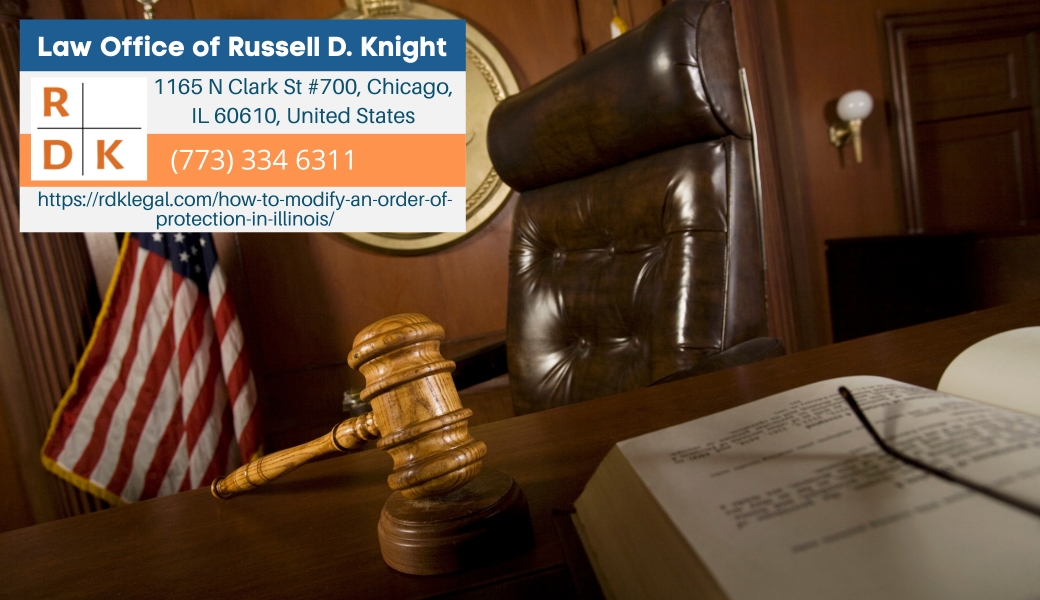Navigating the aftermath of an order of protection can be daunting, especially when circumstances change. Chicago family law attorney Russell D. Knight (https://rdklegal.com/how-to-modify-an-order-of-protection-in-illinois/) offers a detailed look at how individuals can pursue modifications to an order of protection in Illinois. Drawing from state statutes and real-world legal practices, Knight provides clarity on a topic that often brings confusion and urgency for those affected.
A Chicago family law attorney like Russell D. Knight understands that an initial order of protection can severely impact a person’s living situation, family interactions, and legal standing. As Knight points out, the courts often grant these orders based on one party’s testimony, frequently without prior notice or a chance for the accused party to respond. However, contrary to what many believe, these orders are not necessarily permanent and may be modified if legal standards are met.
For individuals facing life-altering consequences from an emergency or interim order of protection, Chicago family law attorney Russell D. Knight outlines a clear path forward. Emergency and interim orders, by design, are temporary and more easily subject to modification. Knight references Illinois law, stating, “Upon 2 days’ notice to petitioner... a respondent subject to an emergency or interim order of protection... may appear and petition the court to re-hear the original or amended petition.” This legal provision allows individuals who did not receive proper notice of the original order to request a review, particularly when they have a valid defense or the order was improperly granted.
When it comes to plenary orders of protection, which are longer-term and often follow a full hearing, Knight notes that the bar for modification is higher. Still, as the article explains, changes in law or new facts can warrant adjustments. Visitation, custody, or support provisions within a plenary order can also be altered in accordance with the best interests of the child involved. According to Knight, “A motion to vacate a protective order is considered one seeking to dissolve or modify an injunction,” underscoring the legal principle that these orders are not immune to revision.
As part of the legal process, both petitioners and respondents can request changes. Knight highlights that not all modification efforts stem from the accused; the protected party may also seek changes if they feel the original order did not go far enough. Illinois law allows for the addition or adjustment of remedies if further abuse occurs or if a previously omitted remedy becomes necessary. The law explicitly provides that “the court may modify an emergency, interim, or plenary order of protection” under certain conditions, ensuring flexibility to address ongoing issues.
Knight’s article also draws attention to how orders of protection are handled in the context of divorce or parentage cases. In Illinois, when a divorce is underway, any existing order of protection is typically consolidated into the domestic relations case. This means the judge presiding over the divorce or custody case gains authority to adjust or override the original order. According to Cook County Court Rules, “the order of protection shall be consolidated with the pending domestic relations matter after the hearing on an emergency order of protection.” This integration helps the court manage broader family law issues like support, custody, and parenting time, all of which require cooperation between the parties.
One of the key takeaways from Knight’s discussion is the importance of timing and procedure. Modifications, especially those involving access to a home or children, must be heard quickly. The law requires that any hearing about exclusive possession of a home take place within 14 days of a petition being filed. Delays may constitute a denial of due process, as courts are expected to act swiftly to protect the rights of both parties involved.
The Law Office of Russell D. Knight offers this comprehensive guide as a practical resource for those seeking to modify an order of protection. With a deep understanding of Illinois law and its application in real-life situations, Knight presents actionable information grounded in statutory authority and case precedent.
Understanding the legal routes available can make a significant difference for anyone involved in a protection order, whether as a petitioner seeking additional safeguards or as a respondent aiming to regain stability. Acting quickly, gathering the necessary documentation, and following the proper legal channels are essential to securing a modification.
For those impacted by a protection order and looking for direction on how to seek changes, consulting with a legal professional familiar with family law in Illinois is critical. Russell D. Knight's breakdown of the modification process serves as a vital tool for navigating these sensitive legal matters.
About Law Office of Russell D. Knight:
The Law Office of Russell D. Knight is a Chicago-based family law firm focused on providing guidance in matters related to divorce, custody, and orders of protection. Led by attorney Russell D. Knight, the firm is committed to helping individuals understand and address legal challenges under Illinois family law.
Embeds:
Youtube Video: https://www.youtube.com/watch?v=Nd98Wcj4mWg
GMB: https://www.google.com/maps?cid=13056420905624162796
Email and website
Email: russell@rdklegal.com
Website: https://rdklegal.com/
Media Contact
Company Name: Law Office of Russell D. Knight
Contact Person: Russell D. Knight
Email: Send Email
Phone: (773) 334-6311
Address:1165 N Clark St #700
City: Chicago
State: Illinois 60610
Country: United States
Website: https://rdklegal.com/







